The Nominations and Elections Committee is putting forth a slate of willing and qualified Academy members for elected positions.
Academy members are asked to vote for:
one (1) candidate for President- Elect,
one (1) candidate for Member-at- Large,
one (1) candidate for Research Grants Committee member and
one (1) candidate for Diversity, Equity, and Inclusion (DEI) Committee member.
The slate of candidates follows:
President-Elect (will accede to President in 2024):
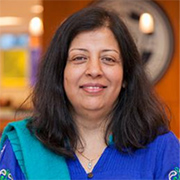
Dr. Samina Akbar joined the department of biomedical sciences at Marian University College of Osteopathic Medicine as an assistant professor of microbiology in 2013. She received her promotion to Associate Professor and tenure in 2016. Dr. Akbar is an experienced microbiologist with fifteen years of experience as an osteopathic educator focusing on human infections caused by bacteria and viruses.
Dr. Akbar earned her Bachelor of Science and Master of Science degrees from the department of microbiology at University of Karachi, Pakistan. She received her Ph.D. in microbiology and molecular biology from University of California Davis. Her dissertation was on genetic analysis of the signal transduction network that activates the transcription factor B of Bacillus subtilis in response to adverse environmental conditions.
Prior to joining MU-COM, Dr. Akbar was a faculty member in the department of microbiology and immunology at Des Moines University College of Osteopathic Medicine. After finishing her Ph.D., Dr. Akbar worked at Harvard Medical School for three years as a postdoctoral fellow in the department of microbiology and molecular genetics working on virulence gene regulation in Salmonella Typhimurium. She then moved to University of British Columbia, Center for Disease Control (Canada) where she was a research associate examining the presence of a Type III secretion system in Chlamydia trachomatis.
Dr. Akbar has been a member of the Indiana Academy of Science (IAS) since 2013 and was appointed chair of the Diversity, Equity, and Inclusion (DEI) Committee of the IAS in 2021 for a three-year term. The committee put together a DEI statement and strategic plan for the Academy. As part of the strategic plan, the DEI Committee requested and received a budgetary allocation of $15,000. to invite proposals for projects that focus on DEI issues from academic institutions across Indiana. The committee awarded six grants to graduate students and faculty from different universities in Indiana. In Iowa, Dr. Akbar served as the Iowa Science Foundation chairperson as well as Grant Reviewer as well as the treasurer of the Northcentral branch of the American Society for Microbiology. She has been a member of the American Society for Microbiology since 1990 and became a member of the Indiana branch of the ASM in 2014. She has been an NBOME and an NBPME Item Writer and reviewer since 2008. Dr. Akbar was appointed NBOME National Faculty in Clinical Microbiology and Immunology in 2013.
Dr. Akbar’s broad research interests include genetic and molecular analysis of gene regulation in both Gram positive and Gram-negative pathogenic bacteria as well as molecular analysis of host-pathogen interactions. The research projects in her lab focus on studying multiple antibiotic resistance in bacteria from different sources including humans, animals, and the natural environment. Currently, her lab is focusing on the isolation and characterization of multiple drug resistant bacteria from fresh bodies of water in greater Indianapolis area.
____________________________________________________________________________________________________________________________________________________
Member-at-Large
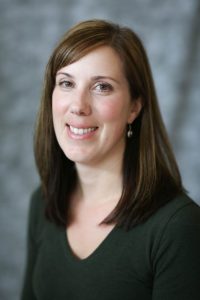
Dr. Erika Sorenson-Kamakian is a molecular and cell biologist who uses the nematode C. elegans to investigate genes and mechanisms responsible for maintaining stem cells in a naïve and totipotent state. Erika is also interested in developing novel methods to control protein expression with tissue specificity and at various time points in development in the nematode. She has been a member of the faculty at Wabash College since 2016. Erika served the Academy as Vice Chair and Chair of the Cell Biology section from 2019-2021 and is a member of the Emerging Scientist Research Competition Task Force.
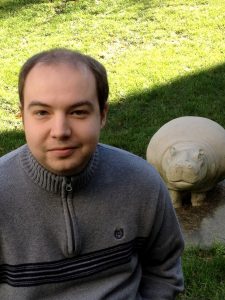
Dr. Chris Stobart is an associate professor of Biology at Butler University. Dr. Stobart is a microbiologist specializing in virus structure, stability, and function. He received his B.S. degrees in biology and chemistry from Xavier University (Cincinnati, OH) in 2008 and his Ph.D. in microbiology and immunology from Vanderbilt University (Nashville, TN) in 2013. His doctoral thesis was titled “Structural and Functional Analysis of Coronavirus Cysteine Protease nsp5” and was completed in the laboratory of Dr. Mark Denison. He continued his research in virology by completing a postdoctoral research fellowship in the laboratory of Dr. Martin Moore at Emory University (Atlanta, GA) where he played a central role in the development of a live-attenuated vaccine candidate for respiratory syncytial virus (RSV), a major human pathogen among infants and the elderly. He joined the Butler University Department of Biological Sciences in the Fall of 2016 and was recently appointed the director of their new interdisciplinary program in public health. Dr. Stobart has served the Academy in several capacities including as Microbiology and Molecular Biology Section Vice Chair and Chair in 2019 and 2020, as a member of the IAS Science and Society Committee, since 2018, and is the current chair of the committee, and has served as mentor for the IAS/Indiana Department of Education STEM Teachers Program, and panelist for the COVID19 Webinar hosted by the Academy and Marian University in the very beginning months of the COVID19 challenge in the United States. He was inducted as a fellow of the Academy in 2022.
____________________________________________________________________________________________________________________________________________________
Diversity, Equity and Inclusion (DEI) Committee
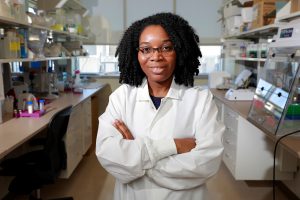
Dr. Chioniso Patience Masamha graduated with a BS Honors Degree in Biological Sciences from the University of Zimbabwe, and a MS degree in Biology from Indiana University of Pennsylvania. She received a PhD. in Biochemistry, Molecular Biology and Biophysics from the University of Oklahoma Health Science Center in Oklahoma City. Her post-doctoral training was at the University of Texas Health Science Center in Houston where she worked in the field of RNA Biology and Cancer. She received a DOD post-doctoral research fellowship to support her research. During that time, she was also an adjunct faculty member in the Biology Department at the University of Houston Downtown. She joined Butler University in Indianapolis in 2015 and is currently a tenured Associate Professor in the Department of Pharmaceutical Sciences in the College of Pharmacy and Health Sciences. After joining Butler, she received research grants from the Indiana Academy of Science and the American Association of Colleges of Pharmacy. More recently, she got an NIH R01 grant from the National Institutes of Health. Her research has been published in top journals, including Nature and Cancer Research, and was highlighted in various news articles including Inside Indiana Business. On a national level, she currently serves as a standing member of the National Cancer Institute’s Biochemical and Cellular Oncogenesis study panel and is a member of the Clinical Pharmacogenetics Implementation Consortium. Throughout her career, she has taught, trained, and mentored B.S, M.S., PhD. and PharmD. students from diverse backgrounds. She received the 2017-2018 Outstanding Professor of the Year Award for her work at Butler University.
____________________________________________________________________________________________________________________________________________________
Research Grants Committee
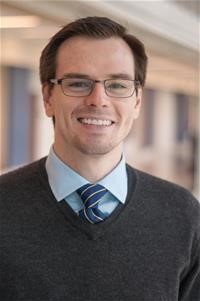
Dr. Jonathan Lowery is Assistant Professor of physiology and Chief Advisor for Research Opportunity Development at the Marian University College of Osteopathic Medicine. He earned a B.S. in biology with minors in chemistry and biblical studies (magna cum laude) from Freed-Hardeman University and a Ph.D. in cell and developmental biology from Vanderbilt University School of Medicine (VUSM). He then completed a postdoctoral research fellowship in developmental biology at Harvard University. His research has resulted in the publication of more than thirty articles or abstracts, reviews, editorials, and book chapters. Lowery is a lifetime teacher, having held adjunct professorships at Lipscomb University and Columbia State Community College, teaching fellowships at Vanderbilt University and Harvard University, and has guest lectured at multiple institutions. Prior to joining the MU-COM faculty, he directed and lectured in the advanced graduate education course on bone/joint development and disease at Harvard School of Dental Medicine. Dr. Lowery presently teaches topics related to musculoskeletal physiology and molecular endocrinology. His research interests center on the cell-to-cell communication pathways underlying human musculoskeletal physiology with an eye toward developing translational modalities. His particular expertise is in the BMP and Activin/TGF-beta signaling pathways, which are essential to human development and health and are dys-regulated in numerous diseases. His Ph.D. work showed for the first time that BMP signaling plays a direct role in the regulation of microvascular tone. And, his postdoctoral studies described how competition between BMP and related pathways regulates postnatal bone mass. His research has resulted in the publication of more than thirty articles or abstracts, reviews, editorials, and book chapters. Dr. Lowery presently serves the Academy as Chair of the Cell Biology Section and a member of the Proceedings Editorial Board.
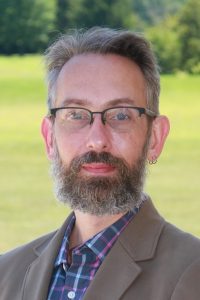
Dr. Adam Rengstorf is an Associate Professor of Physics and Astronomy at Purdue University Northwest (PNW). Dr. Rengstorf received a B.S. in physics from Binghamton University. He received an M.A. and Ph.D. in astronomy at Indiana University. His thesis work developed methods for detecting quasars via their optical variability in a drift-scan survey of the high galactic latitude equatorial sky, along with follow-up spectroscopic confirmation of quasar candidates. After receiving his Ph.D., he worked as a postdoc in the Department of Astronomy and the National Center for Supercomputing Applications at the University of Illinois, Urbana-Champaign. He began at Purdue University Northwest in 2005. In 2016, Dr. Rengstorf was named Director of the Northwest Indiana Robotic (NIRo) Observatory, where he oversees all aspects of the observatory’s operations, upkeep, and teaching & research projects. Most recently at NIRo, he has been running monitoring campaigns, along with PNW physics and engineering majors, for near-Earth asteroids and eclipsing binary stars systems. Dr. Rengstorf has served as vice chair and chair of the IAS Physics and Astronomy section, and as a member of the Proceedings Editorial Board.
____________________________________________________________________________________________________________________________________________________
By financially supporting the Indiana Academy of Science with your contribution, you can help to continue the work of Indiana scientists and aspiring scientists, and help shape a future we can all be proud of.
Copyright © 2024 Indiana Academy of Science. All rights reserved.